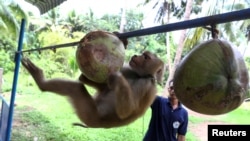A monkey trainer in southern Thailand says that few monkeys are involved in harvesting coconuts for export. His message disputes an activist report that led several British supermarkets to ban coconut products.
Nirun Wongwanich trains monkeys to fetch coconuts at a Thai “monkey school.” He says most coconuts that are used for export are harvested by humans -- with long sticks.
Only a few farms in the south of Thailand use monkeys for taller coconut trees, he said. He also denied claims of animal abuse.
“There is no truth to that. I have been with monkeys for over 30 years ... I have a bond, a relationship with them,” Nirun told the Reuters news agency. He added that he trains six to seven monkeys a year.
Earlier this month, several British companies removed Thai coconut products from their food stores after the group People for the Ethical Treatment of Animals, or PETA, released a report. The report claimed that coconuts in Thailand are picked by abused monkeys.
Prime Minister Boris Johnson’s fiancée Carrie Symonds asked other supermarkets to remove the products as well.
PETA has said it believes that all coconuts from Thailand are picked by monkeys.
Thailand’s government has denied the claims in the PETA report, saying the use of monkey labor is “almost non-existent.”
Mananya Thaiset is Thailand’s deputy minister of agriculture. She said Thailand’s 200,000 coconut growers use almost all human labor and machines for harvesting.
“Even all the monkeys in the entire forest won’t be enough for the industry,” Mananya said.
A PETA official on Saturday rejected the Thai arguments.
PETA’s Asia official, Nirali Shah, said, “The industry’s efforts to sidetrack the issue with a count of the number of farms and monkeys...only shows the world that they are trying to do more of the same – keep monkeys in chains."
Last year, Thailand produced more than 806,000 tons of coconut from more than 1,200 square kilometers, a government report shows. It exported coconut milk worth $396 million. About eight percent of that went to Britain.
I’m Ashley Thompson.
Reuters news agency reported this story. Alice Bryant adapted it for Learning English. Ashley Thompson was the editor.
___________________________________________________________
Words in This Story
coconut - n. a large fruit that has a thick shell with white flesh and liquid inside it and that grows on a palm tree
fetch - v. to go after and bring back something or someone
bond - n. something (such as an interest, experience or feeling) that is shared between people or with people and animals and forms a connection
fiancée - n. a woman that a man is engaged to be married to
sidetrack - v. to cause someone to talk about or do something different and less important
chain - n. a connected series of metal links used for fastening or securing objects and pulling or supporting loads








